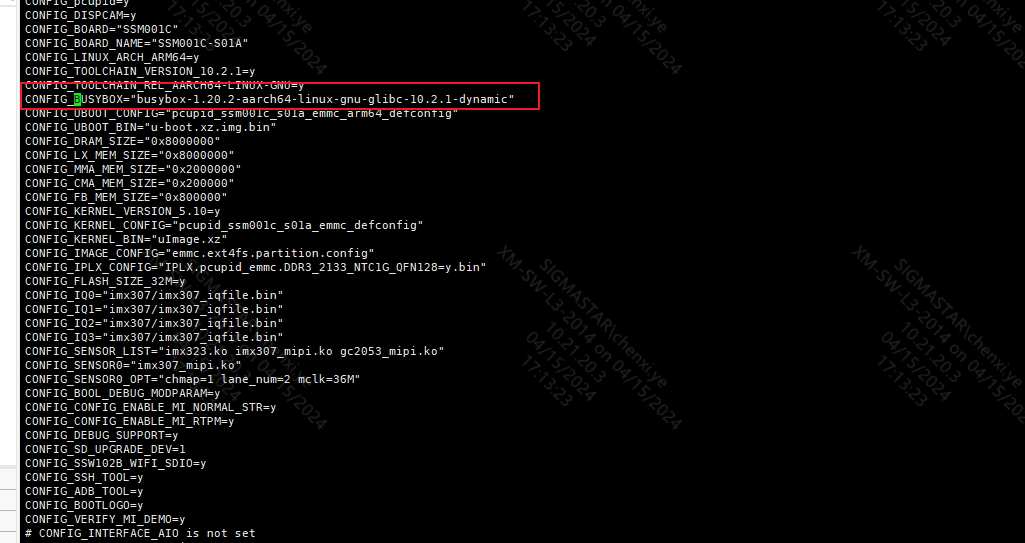Busybox Clipping Reference
1. Production tools¶
1.1 Downloading and Extracting BusyBox¶
This chapter takes BusyBox version 1.20.2 as an example for explanation.
Execute the following command to download and extract busybox-1.20.2.tar.bz2:
wget https://busybox.net/downloads/busybox-1.20.2.tar.bz2 tar -xvf busybox-1.20.2.tar.bz2 cd busybox-1.20.2
You need to use this version and merge it into the attachment busybox_SS.patch
Download the busybox_SS.patch file, place it into the busybox-1.20.2 folder, and execute the following commands:
patch -p1 < busybox_SS.patch
The Busybox source code download address is https://busybox.net/downloads/
1.2 Configure the environment¶
For configuring the compilation environment, please refer to: Section 2.1 Environment Variable Configuration in the Compilation Environment Setup Chapter to select the appropriate compilation environment.
1.3 Compile busybox¶
Next, we will demonstrate how to compile and modify BusyBox using the 64-bit configuration as an example. If you choose to use the 32-bit version, you will need to modify the sstar_alkaid_arm-aarch64-linux-gnu-glibc_defconfig file, specifically the CONFIG_CROSS_COMPILER_PREFIX setting, according to the actual configuration in section 1.2.
make sstar_alkaid_arm-aarch64-linux-gnu-glibc_defconfig make install
Generate the following files in _install/

cd _install/ tar -czf busybox-1.20.2-aarch64-linux-gnu-glibc-10.2.1-dynamic.tar.gz *
The file name to be generated here should be determined according to the platform environment in which busybox will run.
Through the corresponding deconfig under project/configs/demo/defconfigs, we can see:

Copy busybox-1.20.2-aarch64-linux-gnu-glibc-10.2.1-dynamic.tar.gz to project/image/busybox/
make image-fast regenerate image and burn it
2. Busybox clipping reference¶
2.1 Classification by busybox main options¶
| Configuration Options | Space Occupancy | Functional Description |
|---|---|---|
| CONFIG_DESKTOP | 8K | Enable some non-essential configurations for desktop compatibility |
| CONFIG_FEATURE_NON_POSIX_CP | \ | Non-POSIX standard cp command |
| CONFIG_FEATURE_PIDFILE | \ | pid file generation path |
| CONFIG_FEATURE_SUID | \ | Enable root permission management |
| CONFIG_FEATURE_UTMP | \ | Used to record the currently logged in user, which will be used by the who function |
| CONFIG_FLOAT_DURATION | \ | Enable applets to support floating points, e.g. sleep N.NNN |
| CONFIG_INCLUDE_SUSv2 | \ | Enable UNIX 98 support |
| CONFIG_SHOW_USAGE | 7K | applets help information |
| CONFIG_STACK_OPTIMIZATION_386 | \ | i386 architecture stack-boundary=2 |
2.2 Sort by Applets display order¶
The following are the supported configurations for the busybox tool. You can choose whether to enable it as needed.
| Option Name | Module Description |
|---|---|
| Archival Utilities | Various compression formats and compression tool configurations |
| Coreutils | Configuration of common system tools |
| Console Utilities | Console Utilities Configuration |
| Debian Utilities | Debian System Tools |
| klibc-utils | klibc utilities, including minips(ps), nuke(rm -rf), resume, run-init |
| Editors | Editing tools, including sed, awk, vi, etc. |
| Finding Utilities | Configuration of find, grep, xargs and other tool functions |
| Init Utilities | System initialization tools, including reboot, poweroff, halt, etc. |
| Login/Password Management Utilities | Login and Password Management Utilities |
| nux Ext2 FS Progs | Ext2 file system management related tools |
| Linux Module Utilities | Linux module management, insmod/rmmod/modprobe, etc. |
| Linux System Utilities | Linux system administration tools |
| Miscellaneous Utilities | Miscellaneous tools |
| Networking Utilities | Network management tools, configurable Ipv4/ipv6 support, as well as support for tftp, telnetd and other tools |
| Print Utilities | Printer utilities, including lpd/lpr/lpq utilities |
| Mail Utilities | Mail related tools |
| Process Utilities | Process management tools, including free, kill, top, watch, etc. |
| Runit Utilities | Support for runit suite |
| Shells | Includes support for ash and hush shells |
| System Logging Utilities | System log tool support |